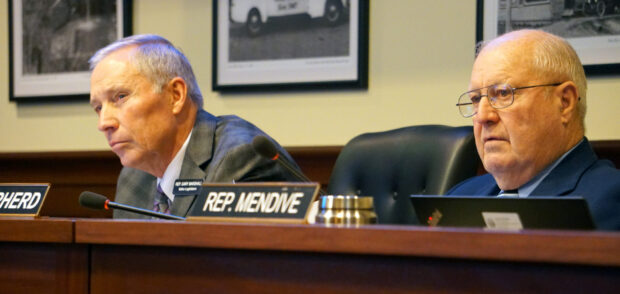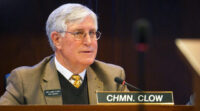A House Education Committee discussion Wednesday revealed some legislators have significant questions and concerns about a proposal to rewrite the school funding formula — and the process by which it is being developed.
At issue is a proposal to scrap Idaho’s 25-year-old attendance-based formula and replace it with an enrollment formula where money follows the student. Because K-12 funding is Idaho’s largest general fund expense each year, any proposal to change the funding formula is being heavily scrutinized by educators, taxpayers and the news media.
Chairman Lance Clow, R-Twin Falls, spent more than an hour walking legislators through the formula and some potential tweaks that have been discussed since a draft was published online Jan. 31.
Clow and Vice Chairman Ryan Kerby, R-New Plymouth, suggested they wanted to gather legislators’ final thoughts before finishing a draft and preparing a bill for an introductory hearing.
But other legislators hadn’t reached that stage.

Rep. Gary Marshall, R-Idaho Falls, said he felt out of the loop.
“Our real problem here is that we, as a committee, have been out of the loop for so long that we’re going to end up asking questions here,” Marshall said during the meeting. “I’m not sure how we even move forward at this point.”
For the past two weeks, a working group has been meeting behind the scenes to try to improve the bill and build consensus. That group includes some members of the Legislature’s education committees; members of a legislative funding formula review committee; State Department of Education and State Board of Education officials; Gov. Brad Little’s staffers and lobbyists for groups such as the Idaho Education Association and Idaho School Boards Association.
Not everyone has had a seat at the table, prompting Marshall to evoke the image of a stadium.
“Right now, we haven’t even been in the upper deck of the stadium since January,” Marshall said. “I’m not sure we can ever get back in the ballgame in any meaningful way.”
After the meeting adjourned, Marshall told an Idaho Education News reporter that he made a mistake during the public meeting and did not want his statements to reflect on the committee. He also told Idaho EdNews not to use his statement to suggest anything about the education committee or to sabotage the funding formula proposal.

Also after the meeting, in a separate conversation in a different room, Clow told Idaho EdNews that he hoped to finalize a new draft of the bill later Wednesday. Clow said he hoped to publish a new spreadsheet model illustrating the funding formula Friday and bring a bill for an introductory hearing as soon as Friday. However, Clow said the bill drafting process and ongoing discussions could delay an introductory hearing until Monday or Tuesday.
Reps. Steve Berch, D-Boise, Judy Boyle, R-Midvale, and Dorothy Moon, R-Stanley, asked several questions of Clow and Kerby during the funding formula discussion.
Based on where negotiations stood Wednesday, Clow said:
- The career ladder salary law would still be run through the funding formula. Under the latest model, districts would be required to pay teachers the minimum salaries called out in both the initial residency rung and initial professional rung of the career ladder. Remaining salaries would continue to be negotiated at the district level.
- The latest draft would not include funding for a controversial proposed wealth adjustment, although the language for the wealth adjustment would remain, for now, at least as a placeholder.
- Even though the formula would still create financial winners and losers compared to baseline 2017-18 funding levels, all districts would be “held positive” during the initial transition to a new formula. Clow said that means all districts and charters would initially receive the same amount of funding as they did in 2017-18, plus a 2 percent increase. At some point, that funding protection would fall away, and districts and charters would rely only on the amount of money provided through the formula.
In order for the state to change its public school funding formula, legislators would need to introduce the change in bill form and then pass that bill through the House and Senate and avoid a veto from Little.
Ybarra’s teacher pipeline bill introduced
In other action Wednesday, a divided House Education Committee voted to introduce schools chief Sherri Ybarra’s teacher pipeline bill.
Ybarra’s communications and policy deputy Marilyn Whitney presented the bill, saying Ybarra wanted to use a multi-pronged approach to recruiting and retaining teachers in rural Idaho.
If the bill is passes, it would create three initiatives:
- A grow-your-own program, where the state and school districts would partner to provide funding for a paraprofessional or classified staff member to earn a teaching certificate though an approved course of study. In exchange, that staff member would need to commit to remaining in the school or district for three years.
- A rural teacher fellowship, whereby the state would provide up to $10,000 per fellow for postsecondary students in upper divisions of Idaho teacher preparation programs for the cost of attendance during the fellowship. The fellows would also need to commit to a rural school for three years following the completion of the fellowship.
- A certification and retention bonus that would provide a $6,000 stipend for teachers and other professional providers in rural districts who pursue additional education or an additional certificate to address hard-to-fill needs in rural schools. Those individuals would also need to commit to a rural school or district for three years.
Based on ongoing concerns over state revenues, Whitney said Ybarra structured the bill so the initiatives would not take effect until July 2020. Originally, Ybarra had asked for $980,000 for 2019-20, but delaying the implementation takes that funding request off the table.
Those budget considerations weren’t enough for Moon, who voted against introducing the bill.
“We have so many balls in the air right now as far as budgeting and funding for education this year,” Moon said. “I can’t see even entertaining this at this time.”
Rep. Bill Goesling, R-Moscow, also voted against introducing the bill, saying that at some point the state is going to run out of money.
Kerby voted in favor of introducing the bill, saying Ybarra’s proposal warranted a full hearing. But he didn’t make any promises about supporting the bill.
“Maybe this is the direction to go and maybe not,” he said.
In the end, only Goesling and Moon opposed introducing the bill, which clears the way for it to return to House Education for a full hearing.
Ybarra’s bill is one of several proposals lawmakers are considering in their efforts to recruit and retain teachers. Just last week, House Education introduced a rural loan forgiveness bill. On Tuesday, the House overwhelmingly passed Gov. Brad Little’s bill to raise minimum teacher salaries to $40,000 over the next two years.
Supplemental levies bill to get a rewrite
A bill to relax the rules for school supplemental levies is headed to the Senate floor.
But it’s unclear what the bill will look like, once senators finish rewriting it.
As currently written, Senate Bill 1061 would allow districts to run a three- to 10-year supplemental levy, as long as local voters have approved levies for at least the seven preceding years.
Currently, districts can seek only one- or two-year levies. District officials often say these levies cover everyday essentials — such as salaries and benefits — and that it’s difficult to make longterm plans while relying on short-term levies.
Several education groups, including the ISBA and the Idaho Association of School Administrators, support SB 1061 in its current form.
But some Senate Education Committee members are uneasy with the bill as written, and said they would rather shorten the maximum timeframe for a levy from 10 years to five years.
The committee voted to send the bill to the Senate’s amending order, where it could be rewritten.
Idaho Education News reporter Kevin Richert contributed to this report.
